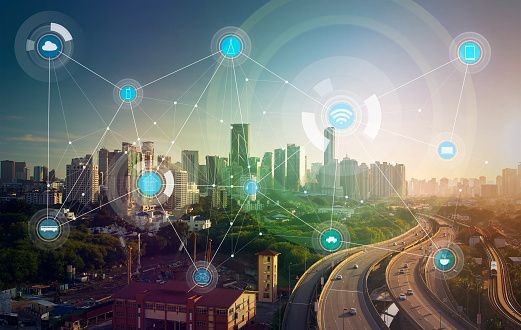Smart building services refer to the integration of advanced technologies like the Internet of Things (IoT), artificial intelligence, and automation into a building’s infrastructure to enhance its operational efficiency, sustainability, and overall performance. These services allow real-time monitoring and control of systems such as lighting, HVAC, security, and energy usage, turning traditional buildings into intelligent ecosystems. Smart building services are rapidly transforming how buildings are designed, managed, and experienced, paving the way for greener and more cost-effective environments.
How Smart Building Services Improve Efficiency
One of the most valuable aspects of smart building services is their ability to improve operational efficiency. Through IoT sensors and automated systems, building managers gain full visibility into energy usage, occupancy patterns, equipment performance, and environmental conditions. For example, lighting and HVAC systems can be adjusted automatically based on occupancy or time of day, reducing waste and saving money.
Another significant efficiency boost comes from predictive maintenance. Rather than reacting to equipment failure, smart building services analyze data to anticipate problems before they happen. This minimizes downtime, reduces repair costs, and prolongs the life of equipment.
Sustainability Benefits of Smart Building Technology
Smart building services play a critical role in driving sustainability. By optimizing resource consumption, they help reduce a building’s carbon footprint and overall environmental impact. Automated systems can manage power, water, and ventilation more precisely than manual operations, leading to significant energy and resource savings.
These services also support integration with renewable energy sources such as solar panels and smart grids. With real-time data analytics, buildings can adjust energy consumption patterns to align with renewable energy production, maximizing efficiency and cost-effectiveness.
Many smart buildings are designed to meet or exceed green building standards like LEED (Leadership in Energy and Environmental Design) or Singapore’s BCA Green Mark. Incorporating smart building services makes compliance with these certifications more achievable.
Key Features of Effective Smart Building Services
The effectiveness of smart building services depends on the capabilities of the systems implemented. Some of the core features include:
- IoT-Based Building Management Systems (BMS): These systems serve as the central nervous system of smart buildings, collecting data from various sensors and controlling operations accordingly.
- Centralized Dashboards: Facility managers can monitor and control all aspects of the building from a single interface.
- Advanced Analytics and Reporting Tools: Data gathered is transformed into actionable insights that support strategic decision-making.
- User-Friendly Interfaces: Touchscreen panels, mobile apps, and voice-controlled assistants make interacting with building systems intuitive and accessible.
Why Businesses Are Adopting Smart Building Services
Businesses across various sectors are increasingly adopting smart building services to meet their evolving needs. Cost reduction is a primary motivator, with automated systems significantly lowering energy bills and maintenance expenses. However, the benefits go far beyond cost savings.
Smart building services enhance comfort and productivity by maintaining optimal environmental conditions. Employees and tenants benefit from better air quality, appropriate lighting, and personalized workspace settings.
Moreover, smart buildings help future-proof properties by increasing asset value and adaptability to future technological advances. Companies committed to sustainability also gain a competitive edge by demonstrating environmental responsibility.
AST’s Role in Delivering Next-Gen Smart Building Solutions
Advancer Smart Technology (AST) is a leader in providing innovative smart building services powered by IoT. AST stands at the forefront of transforming facilities management by offering intelligent, scalable solutions that enhance efficiency, sustainability, and performance.
AST’s Smart IoT-Based Building Management System Solutions turn ordinary spaces into high-performing, environmentally conscious environments. Whether managing a single building or a vast portfolio, AST enables real-time operations monitoring, predictive maintenance, and seamless energy optimization.
One of AST’s unique differentiators is its commitment to data security. With strict adherence to GDPR standards, anonymized data handling, and robust encryption protocols, AST ensures that sensitive information is protected and accessible only to authorized personnel.
AST’s mission revolves around creating a smarter, greener future through technology. Their customer-centric approach, coupled with industry-leading innovation, makes them a reliable partner for organizations looking to embrace smart building services.
Smart Building Services for Different Property Types
Smart building services are highly versatile and can be customized for various types of properties:
- Commercial Buildings: Automate lighting, HVAC, and security to improve tenant satisfaction and reduce operational costs.
- Industrial Facilities: Monitor and manage heavy machinery, air quality, and energy usage with precision.
- Mixed-Use Developments: Integrate residential, retail, and office spaces with tailored automation for each function.
- Educational Institutions and Hospitals: Enhance safety, comfort, and energy efficiency in sensitive environments that require strict compliance and constant monitoring.
Overcoming Common Barriers to Smart Building Adoption
Despite the clear benefits, some organizations hesitate to adopt smart building services due to perceived barriers. One major concern is the upfront cost of implementation. However, the long-term savings from reduced energy bills and maintenance costs often outweigh the initial investment.
Another challenge is integrating new technology with existing legacy systems. Fortunately, many smart building solutions are designed to be modular and scalable, allowing for gradual upgrades without disrupting current operations.
Data privacy and cybersecurity are also valid concerns. With the rise of connected devices, securing data is more important than ever. Providers like AST address this issue head-on by implementing comprehensive security measures that comply with international standards.
Future Trends in Smart Building Services
The landscape of smart building services continues to evolve, driven by advancements in AI, data analytics, and edge computing. One emerging trend is the use of digital twins—virtual models of buildings that simulate performance in real-time. This allows for more accurate predictions and optimized operations.
Artificial intelligence and machine learning are also playing larger roles. These technologies help buildings “learn” from past behavior, adjusting settings automatically to maximize comfort and efficiency.
Decentralized energy systems, such as microgrids and peer-to-peer energy sharing, are becoming more prevalent. Smart building services will be essential in managing these complex energy ecosystems.
How to Choose the Right Smart Building Partner
Selecting a provider for smart building services requires careful consideration. Start by evaluating the provider’s experience, scalability, and support capabilities. Ask questions like:
- Do they offer tailored solutions based on specific building types?
- How do they ensure data security and compliance?
- What kind of post-deployment support and training do they provide?
A strong partner like AST offers not just technology, but a long-term commitment to improving your building’s performance. Look for providers that align with your sustainability goals and offer flexible, future-ready solutions.
Takeaway
Smart building services offer a powerful way to enhance operational efficiency, promote sustainability, and future-proof your property. By leveraging technologies such as IoT, automation, and data analytics, organizations can unlock new levels of performance and comfort.
Partnering with experts like Advancer Smart Technology ensures a smooth transition into intelligent building management. With AST, you gain more than just smart systems—you gain a trusted ally dedicated to creating greener, more responsive environments.















